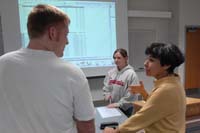About the Department

Mathematics is the language of science, providing a framework for analyzing the world by abstracting from our observations that which is essential to the question at hand. A successful study of mathematics gives the student a powerful approach to solving problems through organization, simplification, and abstraction. This process often leads to solutions and techniques of great beauty independent of their application. The aim of the Department of Mathematics is to give its students an understanding of some of the theories and methods of mathematics as well as an appreciation of their beauty.
In today’s job market, individuals with highly developed analytical and problem-solving skills are in great demand and so there are a number of career options open to the students who choose to major in Mathematics. These include careers in secondary education, actuarial science, operations research, scientific computing, management science and other areas of business. The Department of Mathematics maintains a list of suggested tracks of courses for different career paths, including a 3:2 Dual-Degree Pre-Engineering Program.
Mathematics majors, including first year students, should seek advisement by a member of the mathematics faculty as soon as possible.
All students will begin their study of mathematics with Math 176. The Applied Analysis sequence is an alternative approach to Calculus, which uses a more sophisticated and rigorous approach and integrates multivariate calculus with single variable calculus. Placement into Math 176 or Math 278 (Applied Analysis 2 or 3) via AP credit is not allowed.
Individuals who do not start their college mathematics with calculus should take Math 105, Math 110, or Math 140, depending on their major interests.
Credit will not be allowed for any course that is taken after the successful completion of another course for which the first course was a prerequisite.

The mathematics program at Illinois Wesleyan University is designed to equip our graduates with the skills needed to succeed in this diverse job market.
The book [of nature] is written in mathematical language, and the symbols are triangles, circles and other geometrical figures, without whose help it is impossible to comprehend a single word of it; without which one wanders in vain through a dark labyrinth.
Galileo Galilei
Having trouble viewing the booklet?
Answers to the Big QuestionsWhy is mathematics such a rewarding major? What exciting projects are current mathematics majors working on? |
| Student Learning Goals of the Mathematics Major |
|
Goal 1 : Analytical Skills ◦ Learning the mathematical language and how to read mathematics. |
|
Goal 2 : Rigorous, Logical Thinking Skills ◦ Developing reasoning skills. |
|
Goal 3: Problem-Solving Skills ◦ Developing a knowledge base. |
|
Goal 4 : Communication Skills ◦ Learning how to read and write mathematical proofs. |
|
Goal 5 : Computer Skills ◦ Learning how to use computers to solve complex problems. |
